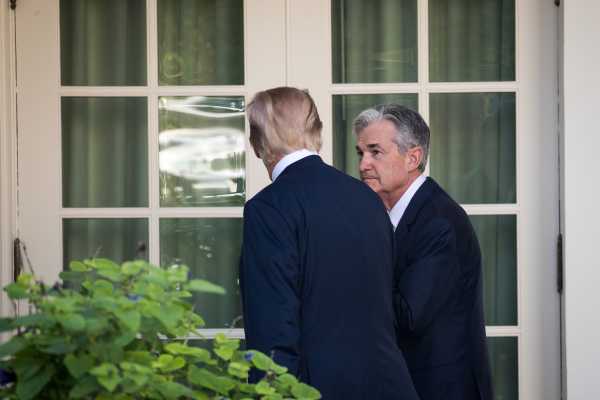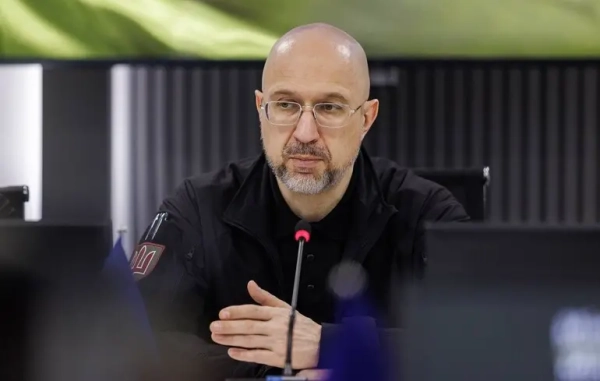
President Donald Trump is back to tweeting about the Federal Reserve in an apparent last-ditch effort to keep the central bank from making a move he fears could dampen the economy.
On Monday morning, he fired off a tweet saying it is “incredible” that the Fed “is even considering another interest rate hike.” The Federal Open Market Committee (FOMC), the Fed’s monetary policymaking body, has a meeting this week and is expected to raise interest rates on Wednesday for the fourth time this year.
Trump is not happy about it.
The president has been critical of the Fed and Chair Jerome Powell, his pick for the post, for quite some time in both interviews and on Twitter. In a sit-down with the Washington Post in November, Trump said he’s “not even a little bit happy” with Powell and criticized the Fed for not bending to his will.
“I’m doing deals, and I’m not being accommodated by the Fed,” he said. “I’m not happy with the Fed. They’re making a mistake because I have a gut, and my gut tells me more sometimes than anybody’s brain can ever tell me.”
Why is Trump so worried about the Fed? The Fed is responsible for influencing the availability and cost of credit in the American economy, and it does that by setting the “federal funds rate” — the interest rate banks charge each other for overnight loans. Banks, in turn, increase the interest rates they charge their customers. Trump is concerned that when the Fed raises interest rates, that will hurt the stock market he’s tethered his presidency to and pump the brakes on the economic growth he’s promised.
Basically, Trump doesn’t want the Fed making any decisions that could put the stock market or economy at risk while he’s in the White House.
It’s not great for a president to be so publicly critical of the Fed, even if Trump might have a point
During the financial crisis, the Fed slashed interest rates to zero and kept them there for years in an effort to help stimulate the economy. It raised interest rates for the first time since 2006 in December 2015 and has been slowly hiking them by a quarter of a percentage point ever since. Right now, the federal funds rate is 2 to 2.25 percent, and it’s likely to increase by another quarter of a point this week.
There’s plenty of room for debate as to whether the Fed is on the right track here. The infamous saying about the Fed is that its job is to “take away the punch bowl just as the party gets going” — in other words, cool down the economy before it heats up too much — and not all economists are on board with whether we’re there yet.
As Vox’s Matt Yglesias wrote earlier this year, “there’s a strong case on the merits that Trump is right and more patience would be better for the country as a means of promoting further healing in the labors market.” Inflation isn’t at “virtually” nothing, as Trump suggested, but it’s not exploding and is about in line with the Fed’s goal of 2 percent.
Beyond the debate of what the Fed should or shouldn’t do, the underlying issue is that the president is, traditionally, supposed to stay out of the Fed’s way and let it act independently, or at least give it the appearance of such. It’s not unheard of for presidents to try to push the Fed to act one way or another — Lyndon Johnson and Harry Truman publicly clashed with the central bank — but over the past few decades, most of the cajoling, if there has been any, has taken place behind closed doors.
Trump’s public criticism of the Fed puts more focus on the central bank and opens it up to accusations of politicization. The pressure could push the Fed to raise rates just to prove it’s acting independently. Or, if it doesn’t raise rates, it will face accusations that it is kowtowing to Trump. That happened in some circles in November, when Powell said in a speech that interest rates were “just below” neutral and some suggested the remarks were an effort to acquiesce to criticism from the White House.
Beyond trying to pressure the Fed into not making moves he thinks might slow down the stock market and economy, Trump’s criticism of the Fed also sets it — and, specifically, Powell — up as the fall guy if things do go south. The president has demonstrated that he’s often eager to take responsibility for good things and pass on the blame for the bad, and his attacks on the Fed appear to be, in part, a preemptive attempt at that.
Sourse: vox.com






